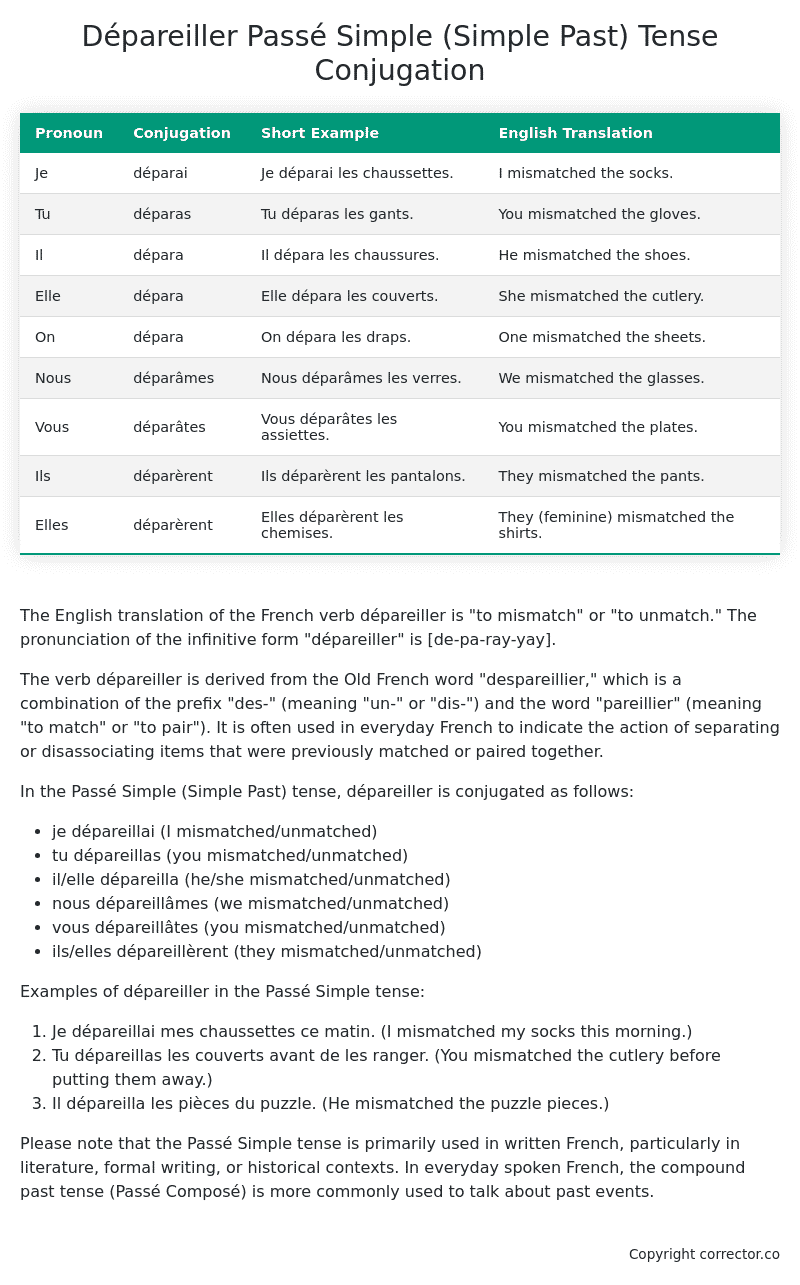Passé Simple (Simple Past) Tense Conjugation of the French Verb dépareiller
Introduction to the verb dépareiller
The English translation of the French verb dépareiller is “to mismatch” or “to unmatch.” The pronunciation of the infinitive form “dépareiller” is [de-pa-ray-yay].
The verb dépareiller is derived from the Old French word “despareillier,” which is a combination of the prefix “des-” (meaning “un-” or “dis-“) and the word “pareillier” (meaning “to match” or “to pair”). It is often used in everyday French to indicate the action of separating or disassociating items that were previously matched or paired together.
In the Passé Simple (Simple Past) tense, dépareiller is conjugated as follows:
- je dépareillai (I mismatched/unmatched)
- tu dépareillas (you mismatched/unmatched)
- il/elle dépareilla (he/she mismatched/unmatched)
- nous dépareillâmes (we mismatched/unmatched)
- vous dépareillâtes (you mismatched/unmatched)
- ils/elles dépareillèrent (they mismatched/unmatched)
Examples of dépareiller in the Passé Simple tense:
- Je dépareillai mes chaussettes ce matin. (I mismatched my socks this morning.)
- Tu dépareillas les couverts avant de les ranger. (You mismatched the cutlery before putting them away.)
- Il dépareilla les pièces du puzzle. (He mismatched the puzzle pieces.)
Please note that the Passé Simple tense is primarily used in written French, particularly in literature, formal writing, or historical contexts. In everyday spoken French, the compound past tense (Passé Composé) is more commonly used to talk about past events.
Table of the Passé Simple (Simple Past) Tense Conjugation of dépareiller
| Pronoun | Conjugation | Short Example | English Translation |
|---|---|---|---|
| Je | déparai | Je déparai les chaussettes. | I mismatched the socks. |
| Tu | déparas | Tu déparas les gants. | You mismatched the gloves. |
| Il | dépara | Il dépara les chaussures. | He mismatched the shoes. |
| Elle | dépara | Elle dépara les couverts. | She mismatched the cutlery. |
| On | dépara | On dépara les draps. | One mismatched the sheets. |
| Nous | déparâmes | Nous déparâmes les verres. | We mismatched the glasses. |
| Vous | déparâtes | Vous déparâtes les assiettes. | You mismatched the plates. |
| Ils | déparèrent | Ils déparèrent les pantalons. | They mismatched the pants. |
| Elles | déparèrent | Elles déparèrent les chemises. | They (feminine) mismatched the shirts. |
Other Conjugations for Dépareiller.
Le Present (Present Tense) Conjugation of the French Verb dépareiller
Imparfait (Imperfect) Tense Conjugation of the French Verb dépareiller
Passé Simple (Simple Past) Tense Conjugation of the French Verb dépareiller (You’re reading it right now!)
Passé Composé (Present Perfect) Tense Conjugation of the French Verb dépareiller
Futur Simple (Simple Future) Tense Conjugation of the French Verb dépareiller
Futur Proche (Near Future) Tense Conjugation of the French Verb dépareiller
Plus-que-parfait (Pluperfect) Tense Conjugation of the French Verb dépareiller
Passé Antérieur (Past Anterior) Tense Conjugation of the French Verb dépareiller
Futur Antérieur (Future Anterior) Tense Conjugation of the French Verb dépareiller
Subjonctif Présent (Subjunctive Present) Tense Conjugation of the French Verb dépareiller
Subjonctif Passé (Subjunctive Past) Tense Conjugation of the French Verb dépareiller
Subjonctif Imparfait (Subjunctive Imperfect) Tense Conjugation of the French Verb dépareiller
Conditionnel Présent (Conditional Present) Tense Conjugation of the French Verb dépareiller
Conditionnel Passé (Conditional Past) Tense Conjugation of the French Verb dépareiller
Conditionnel Passé II (Conditional Past II) Tense Conjugation of the French Verb dépareiller
L’impératif Présent (Imperative Present) Tense Conjugation of the French Verb dépareiller
L’impératif Passé (Imperative Past) Tense Conjugation of the French Verb dépareiller
L’infinitif Présent (Infinitive Present) Tense Conjugation of the French Verb dépareiller
L’infinitif Passé (Infinitive Past) Tense Conjugation of the French Verb dépareiller
Le Participe Présent (Present Participle) Tense Conjugation of the French Verb dépareiller
Le Participe Passé (Past Participle) Tense Conjugation of the French Verb dépareiller
Struggling with French verbs or the language in general? Why not use our free French Grammar Checker – no registration required!
Get a FREE Download Study Sheet of this Conjugation 🔥
Simply right click the image below, click “save image” and get your free reference for the dépareiller Passé Simple tense conjugation!

Dépareiller – About the French Passé Simple (Simple Past) Tense
Formation
Usage
Narration
Historical Context
Interactions with other tenses
Passé Composé
Imparfait
Conditional and Subjunctive
Summary
I hope you enjoyed this article on the verb dépareiller. Still in a learning mood? Check out another TOTALLY random French verb conjugation!


